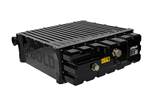Swancor applies EzCiclo recycling resin to Liux EV prototype
Cooperation with Spanish automotive startup has achieved automotive parts comprising EzCiclo RH512 thermoset resin and linen fiber that can be fully separated, adjusted and returned into circularity.
Liux Geko breakdown. Source (All Images) | Swancor, Liux
(Nantou, Taiwain) marks its official entry into the automotive industry with its technology’s successful application in Geko, Spanish startup ’s electric vehicle (EV) prototype. The vehicle incorporates EzCiclo RH512, the Swancor thermoset resin containing ≥10% bio-based raw material.
Geko’s automotive fenders, bumpers, doors and tailgate are all made using liner fiber and EzCiclo, meaning they can be fully separated and decomposed through Swancor’s CleaVER liquid at 150ËšC for 4 hours. According to Swancor, the decomposition process generates no waste liquid nor exhaust and lower carbon footprint compared with incineration. The recycled liner fiber is remade into yarn after being carded, drawn and twisted; the recycled resin can be used after chemical modification and formula adjustment. During the development process, Swancor conducted numerous testing and adjustments to meet the high standard and strict quality of the automotive industry.
Swancor says it has applied this technology to automotive parts to provide energy efficiency and sustainable solutions for the EV industry. The resulting Liux Geko concept reportedly reduces CO2 footprint throughout its product life by 40% compared to efficient electric cars, and up to 80% compared to a gasoline SUV.
In addition to what was used for this project, Swancor EzCiclo RH512 resin offers another formula containing more than 25% recycled plastics. Both formulas are suitable for vacuum infusion and hand layup process, and can been applied in EV body parts with liner fiber.
Liux Geko will be presented at this year’s JEC World.
Related Content
-
European boatbuilders lead quest to build recyclable composite boats
Marine industry constituents are looking to take composite use one step further with the production of tough and recyclable recreational boats. Some are using new infusible thermoplastic resins.
-
Life cycle assessment in the composites industry
As companies strive to meet zero-emissions goals, evaluating a product’s carbon footprint is vital. Life cycle assessment (LCA) is one tool composites industry OEMs and Tier suppliers are using to move toward sustainability targets.
-
Plant tour: Daher Shap’in TechCenter and composites production plant, Saint-Aignan-de-Grandlieu, France
Co-located R&D and production advance OOA thermosets, thermoplastics, welding, recycling and digital technologies for faster processing and certification of lighter, more sustainable composites.






